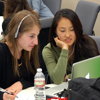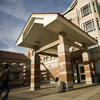Professional Development Videos
Listen and Listen Again
In this video, USC Shoah Foundation’s Executive Director Stephen Smith examines the nature and complexity of memory and testimony through the narrative of Holocaust survivor Pinchas Gutter.
Constructivist Theory and the Use of Video Testimony in Education
Language: English
This video explores the connection between Constructivist Theory and the principles of teaching with testimony. It also highlights how testimony encourages active learning, which allows for students to incorporate new information in order to change or reorganize their preexisting thoughts and beliefs.
Listen and Listen Again
Language: English
In this video, USC Shoah Foundation’s Executive Director Stephen Smith examines the nature and complexity of memory and testimony through the narrative of Holocaust survivor Pinchas Gutter.
Ethical Editing
Language: English
Professors Holly Willis and Steve Anderson of USC’s Institute for Multimedia Literacy lead a discussion with educators about considerations for making “ethical” editorial decision when developing videos that use eyewitness testimony.
Teaching, Testimony, and Transformation: Understanding the Global Landscape
Language: English
Kim Feinberg, USC Shoah Foundation Regional Consultant in South Africa and Founder and CEO of the Tomorrow Trust, and Freddy Mutanguha, Director of the Kigali Genocide Memorial Centre in Rwanda, address the importance of using testimony in education from a global perspective. This video is excerpted from the keynote presentation, Teaching, Testimony, and Transformation: Understanding the Global Landscape, at the Institute’s Teaching with Testimony Master Teacher Program Best Practices Workshop in August 2012.
2013/02/11: Lecture with Dr. Howard Gardner, "Digital Media, Learning, and Empathy"
Language: English
February 11, 2013: Dr. Howard Gardner, best known for his theory of multiple intelligences, engaged in a public conversation on the art science of 21st-century education with Dr. Mary Helen Immordino-Yang, an award-winning behavioral and social scientist and faculty member at the University of Southern California.

